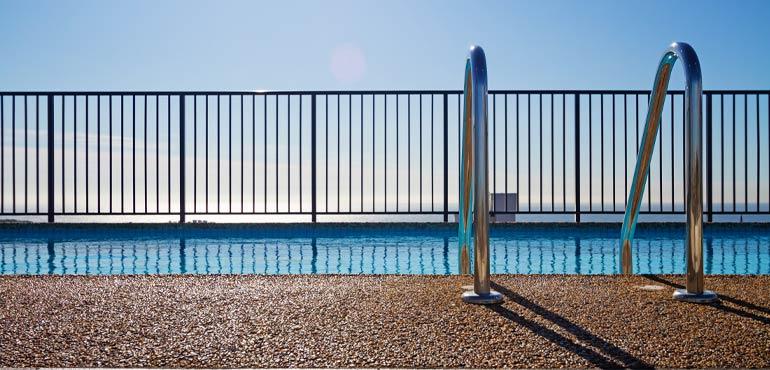
- Home
- Your property
- Swimming pools
- Swimming pool safety laws
Swimming pool safety laws
Swimming pool safety laws aim to minimise the chance that young children can get into the pool area unsupervised.
Definition of a swimming pool
Queensland laws define a swimming pool as any structure that:
- is capable of being filled with water to a depth of 300mm or more
- is used primarily for swimming, wading, paddling or the like.
This applies to wading pools (including blow-up pools) and spas.
Throughout Queensland the state government's pool safety laws applies to all pools, including those at:
- houses
- unit complexes
- hotels
- motels
- backpacker accommodation
- boarding houses
- caravan parks
- mobile van parks.
The pool laws don't apply to fishponds or structures that have been designed, manufactured, or adapted to be solely or principally used for ornamental purposes. This includes where the fish pond or structure is capable of being filled with water to a depth of 300mm or more. Please note that a fish pond that is also being used for swimming may be considered a swimming pool and therefore be required to comply with the pool safety standard.
Responsibilities if you have a pool
As a pool owner you must:
- register your pool with the QBCC or face a fine
- have a pool fence that meets the pool barriers safety standard
- maintain your pool fence to meet the safety standard ongoing
- get a pool safety certificate if you are selling or leasing your property
- keep pool gates closed
- keep the pool area clear of objects that children could use to enter the pool unattended.
These rules apply even to small inflatable pools if they can hold 300mm or more of water.
We recommend you engage a licensed pool safety inspector to inspect your pool and confirm it is compliant.
As a tenant you must:
- keep pool gates closed
- never prop open a gate
- keep the pool area clear of objects that children could use to enter the pool unattended
- let your landlord know if the fence is broken or does not comply with pool safety laws, e.g. if the gates don't self-close every time.
An unsafe or non-compliant pool is able to be reported to the Local Council at any time.
Tips to make your pool safer
- Reduce the height of surrounding ground levels and garden beds to make sure your entire fence has a minimum height of 1200mm measured from the ground.
- Adjust gate hinges to make the gate self-closing.
- Oil the gate hinges and latch to make sure the gate is self-closing and self-latching.
- Shield any climbable objects by securely attaching a non-climbable material such as flat polycarbonate sheeting to the outside of the fence.
- Trim climbable vegetation and tree branches that are within 900mm of the pool fence (if branches overhang from next door, negotiate with your neighbour to remove them).
- Secure all moveable objects near the pool to ensure nothing can be moved within 900mm on the outside and within 300mm on the inside.
- Permanently adjust windows that open directly into the pool area so they can't open more than 100mm (using a window lock alone does not comply).
- Install permanently fixed security screens on windows to prevent a child gaining access to the pool from inside the house.
- Ensure your louvres have gaps of less than 100mm between the blades.
Pool safety management plans
Owners of pools associated with class 3 buildings (e.g. hotels and motels) must have either a valid pool safety certificate or an approved pool safety management plan. Applications to continue to use the plan must be made annually.